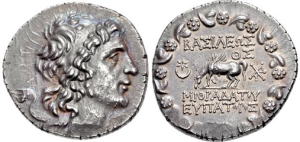The lectionary reading last week (Matthew 2:1-12) contained the reference to the μαγοι απο ανατολων, “the magi from the rising [East].” The word μαγοι is most frequently translated as “wise men” (NET, NJB, NLT, NRSV, RSV, ASV, ESV, CEV, and KJV). The KJV has probably influenced this continued usage. A few translations transliterate μαγοι simply as “magi” (NIV, NAS, and CEB). The last one, the Common English Bible, is a little ironic since the term magi is not common English as far as I know. For a more colloquial translation, I might suggest “star gazers from the East” or perhaps “astrologer-priests from the East.” The latter captures better the essence of the μαγοι and their role. Goodspeed’s translation is one of the few that uses “astrologers.” As an aside, a good article on magi is “Note XIV. Paul and the Magus,” by Arthur Darby Nock (pp. 164-82) in The Beginnings of Christianity, Part I: The Acts of the Apostles, Volume 5, ed. F. J. Foakes Jackson and Kirsopp Lake (New York: Macmillian, 1933). This volume can be found at the Internet Archive which is an outstanding online resource. One can find this book, plus others, in PDF, Epub, or various other formats. One can even listen to this book being read aloud. It is quite humorous to hear the computer-generated voice attempting to pronounce the frequently cited Greek words and phrases. Nock was writing in a day and age when knowing Greek was just an expectation for an educated person so he peppers this essay with Greek.
While the μαγοι brought gold, frankincense and myrrh, what is sometimes missed is also the cultural and historical baggage they brought into the city of Jerusalem. A powerful kingly image from the East that they must have carried in their tradition was Mithradates VI. Rarely is the background of Mithradates noted when considering the magi. A good recent book on Mithradates is by Adrienne Mayor, The Poison King: The Life and Legend of Mithradates, Rome’s Deadliest Enemy (Princeton: Princeton University Press, 2010). Mithradates was from the East; his center of rule was near Pontus and the Black Sea. He was born around 135 BC and died in 63 BC. While his death was sixty years before Jesus’ birth, he made a significant impact on Rome, Greece, Asia, and vast parts of the Mediterranean world; his influence was still felt even into the first century. Mithradates own birth, according to legend, was heralded by a comet, he assumed the title “King of Kings,” and was the one ruler in the Mediterranean world that offered the most violent resistance to Rome and its growing power.

This coin illustrates on the obverse the portrait of Mithradates with a diadem. On the reverse is the winged-horse Pegasus grazing and a star-in-crescent. It was minted in Pergamon around 89 BC.
Exploring the life of Mithradates could be helpful in examining Matthew 2. Perhaps the author of Matthew is setting King Jesus in contrast not to Herod (who was only a puppet of Rome) but to Mithradates, King of Kings, whose legend continued to permeate and percolate through the East. Here were two kings born under starry consequences who both opposed Rome, but in startling different ways.
 Dodgson has two connections of interest for theological studies. First, as is evident from the photograph of his grave (which I snapped in 1985), he was Reverend Charles Dodgson. Rarely do people note the fact he was ordained a deacon in the Anglican Church. He declined, however, to be ordained a priest. Second, the story of Alice’s Adventure in Wonderland is often connected to a young girl by the name of Alice Liddell. She and her family were good friends of Dodgson. Her father was Henry Liddell, Dean at Christ Church. He is best known for his work with Robert Scott on the Greek-English Lexicon. While the focus of this lexicon is related to classical Greek, it is extremely helpful for the non-biblical background of NT words. One can access a later edition (1940 unabridged edition) via the Persus Project: Liddell and Scott.
Dodgson has two connections of interest for theological studies. First, as is evident from the photograph of his grave (which I snapped in 1985), he was Reverend Charles Dodgson. Rarely do people note the fact he was ordained a deacon in the Anglican Church. He declined, however, to be ordained a priest. Second, the story of Alice’s Adventure in Wonderland is often connected to a young girl by the name of Alice Liddell. She and her family were good friends of Dodgson. Her father was Henry Liddell, Dean at Christ Church. He is best known for his work with Robert Scott on the Greek-English Lexicon. While the focus of this lexicon is related to classical Greek, it is extremely helpful for the non-biblical background of NT words. One can access a later edition (1940 unabridged edition) via the Persus Project: Liddell and Scott.


